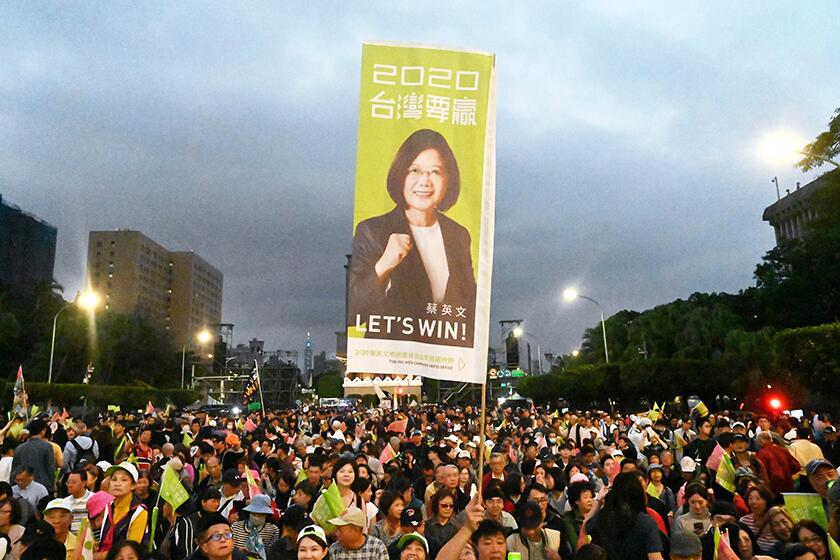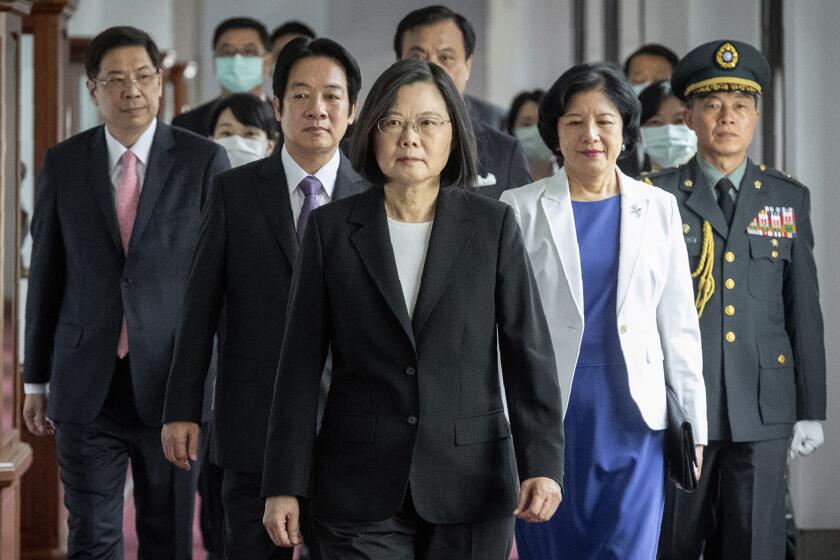Biden says U.S. would intervene militarily in Taiwan if necessary

President Biden said Monday that the U.S. would intervene militarily in Taiwan if China were to invade the country.
- Share via
TOKYO — President Biden said Monday that the United States would intervene militarily in Taiwan if necessary, in an apparent shift away from the U.S. policy of “strategic ambiguity” that quickly ratcheted up tensions with China.
The comment — not the first instance of Biden’s blunt rhetoric on the world stage causing confusion and geopolitical uncertainty — suggested a willingness by the president to go further in defending Taiwan than he has in aiding Ukraine. The Ukrainian government has received tens of billions of dollars in arms and intelligence assistance in the war launched by Russia but not the direct intervention of U.S. or North Atlantic Treaty Organization troops.
“You didn’t want to get involved in the Ukraine conflict militarily for obvious reasons,” a reporter said to Biden during the president’s joint news conference in Tokyo with Japanese Prime Minister Fumio Kishida. “Are you willing to get involved militarily to defend Taiwan if it comes to that?”
“Yes,” Biden responded, adding: “That’s the commitment we made.”
But he said an invasion of the island by China was highly unlikely.
“My expectation is it will not happen,” Biden said. “It will not be attempted.”
President Biden’s invitation for Taiwan to participate in his democracy summit draws the island deeper into the struggle between China and the U.S.
Biden made similar comments at a televised town hall in October, only to have the White House walk them back. The U.S. has made a commitment to provide Taiwan the means to defend itself but — just as there is no NATO obligation for the U.S. to defend Ukraine — has no treaty to defend it militarily.
Before making the comments, Biden said U.S. policy toward Taiwan “has not changed at all.”
“We agree with the ‘one-China’ policy,” Biden said, referring to the longstanding position of recognizing the People’s Republic of China as the country’s sole legal government. “But the idea that — that it can be taken by force ... is just not appropriate. It will dislocate the entire region and be another action similar to what happened in Ukraine. And so, it’s a burden that is even stronger.”
But he also warned China against an invasion and said it was important for the U.S. and other nations to send a signal to Beijing by upholding sanctions imposed on Russia after its invasion of Ukraine.
“Russia has to pay a long-term price for that in terms of the sanctions. It’s not just about Ukraine,” Biden said, adding that, if Russia were not made to suffer long-term consequences, “what signal does that send to China about the cost of attempting to take Taiwan by force?”
The suspect in the shooting at a Laguna Woods church is believed to have been driven in part by the political belief that Taiwan is a part of China.
The comments drew a swift response from Beijing. Chinese Foreign Ministry spokesperson Wang Wenbin expressed “strong dissatisfaction and resolute opposition” to Biden’s comments.
“China has no room for compromise or concessions on issues involving China’s core interests such as sovereignty and territorial integrity,” he said. “China will take firm action to safeguard its sovereignty and security interests, and we will do what we say.”
For its part, the Taiwanese government said in a statement that it was grateful to the U.S. for “reaffirming its rock-solid commitment to Taiwan.”
When asked Monday about any contingency plans to provide military support for Taiwan, Defense Secretary Lloyd J. Austin III declined to discuss specifics and insisted official policy has not changed.
“As the president said, our one-China policy has not changed,” he said in a news conference at the Pentagon, which Joint Chiefs of Staff Chairman Gen. Mark A. Milley also attended.
Biden “reiterated that policy and our commitment to peace and stability across the Taiwan Strait,” the Defense secretary said. That includes, Austin said, the U.S. pledge to supply Taiwan with the “means” to defend itself in case of attack.
For decades, Washington has pursued a policy of “strategic ambiguity” that does not spell out exactly what the U.S. would do if the democratically self-governed island — which China claims as its rightful territory — were attacked.
Although the U.S. says it’s committed for the long haul, there’s no evidence it has a plan to shorten or help Ukraine in what’s shaping up to become a protracted conflict.
The act dates to 1979, when Washington switched diplomatic recognition from Taipei to Beijing.
Biden’s comment in Tokyo was reminiscent of his remarks in Warsaw two months ago when he declared that Russian President Vladimir Putin “cannot remain in power.” Aides quickly clarified that the president was speaking in a personal capacity and not, in fact, announcing a drastic shift in U.S. policy to one of a change of governments in Moscow.
But in this instance, some foreign policy experts took issue more with the administration’s quick downplaying of Biden’s remarks rather than with their substance.
A stronger army is needed to deter a wider conflict that could entangle the U.S. at a time when calls are growing in Washington to defend the island.
Richard N. Haass, the president of the Council on Foreign Relations, tweeted that a shift to a policy of “strategic clarity” was “exactly right given China’s military buildup.” In the event of an invasion, Taiwan’s geography as an island nation and its military weakness compared with that of Ukraine, he said, would require the kind of direct military involvement that the U.S. has steered clear of with regard to Ukraine.
“This is the third time @POTUS has spoken out in favor of strategic clarity on Taiwan and third time WH staff has tried to walk it back,” Haass wrote. “Better to embrace it as new US stance, one that is fully consistent with one-China policy but that alters how US will go about implementing it.”
Ian Bremmer, president of the Eurasia Group, a New York-based global risk assessment firm, said a U.S. position muddled by an apparent gap between Biden’s comments and his administration’s stated policy position could be advantageous in creating more confusion in Beijing. But there is no need to create additional uncertainty and tension with China at the moment, Bremmer said.
“There was never credibility around the notion of the U.S. going to war in Ukraine and there has always been credibility about military involvement in Taiwan, so in a way this is much ado about nothing,” Bremmer said. “But we are right now in a better position vis-a-vis China: The Russian military is showing they are completely incapable, and the U.S. is leading a much stronger allied response to Ukraine than anyone thought possible, and the Chinese are taking that away as a lesson. So this really isn’t the time we need to be making hay on Taiwan.”
Breaking News
Get breaking news, investigations, analysis and more signature journalism from the Los Angeles Times in your inbox.
You may occasionally receive promotional content from the Los Angeles Times.
The situation regarding Taiwan has historically been one of the prime tinderboxes in Sino-U.S. relations, with even the slightest shifts in policy or tone parsed thoroughly in Beijing, Taipei and Washington.
In 2001, when then-President George W. Bush made comments similar to Biden’s, vowing that the U.S. would do “whatever it took” to help Taiwan defend itself, the administration also insisted that U.S. policy had not changed.
Biden’s comments raising new doubt about the U.S. commitment to its one-China policy come on the eve of China’s 20th Communist Party congress later this year — and could provide President Xi Jinping, eager to cement his power through a third term, a pretext for escalating matters with Taiwan, according to Bonnie Glaser, Asia program director at the German Marshall Fund, a nonpartisan think tank.
“If [Xi] feels backed into a corner, he may be forced to act in a way that would be contrary to what President Biden actually wants to see,” Glaser said.
Even short of that, any additional tension will further complicate cooperation in other areas, she added.
“There’s so much distrust that there are already insurmountable challenges to cooperation in the U.S.-China relationship,” she said. “It’s just become exceedingly difficult to work together on any issue.”
Kishida, speaking at the same news conference, said that the subject of Taiwan had come up in his meeting earlier Monday with Biden and that there was no fundamental change in policy by either country.
“We are against any unilateral attempt to change the status quo by force in Asia,” the prime minister said. He said that was why Japan had been cooperating with U.S.-led efforts to sanction Russia and provide assistance to Ukraine.
Kishida reiterated the importance of the U.S. commitment to defend Japan in the event that it is attacked.
“We have full confidence in the response of the United States,” he said.
Bierman reported from Tokyo and Stokols from Washington. Times staff writers Henry Chu in London, Courtney Subramanian and Tracy Wilkinson in Washington and Stephanie Yang in Taipei, Taiwan, contributed to this report.
More to Read
Get the L.A. Times Politics newsletter
Deeply reported insights into legislation, politics and policy from Sacramento, Washington and beyond. In your inbox three times per week.
You may occasionally receive promotional content from the Los Angeles Times.















